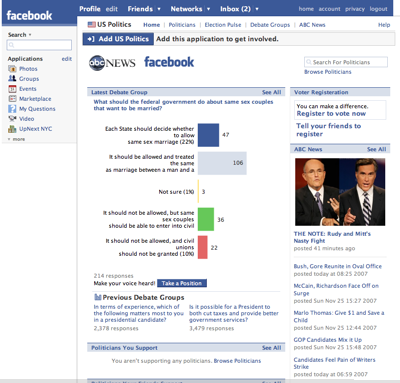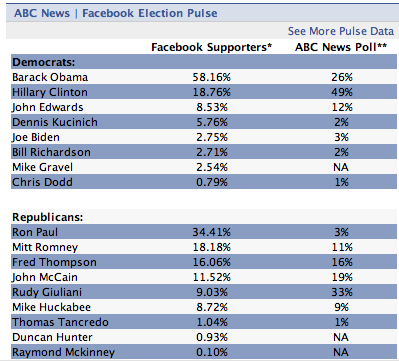 This is the year that the Presidential debates get their Web on. First, we had CNN and YouTube partner together for a set of debates where the questions came in the form of YouTube videos. And now ABC News is hitching its debate wagon to Facebook for the New Hampshire debates on January 5. Facebook already has many debate groups within its U.S. Politics section, and most candidates use it to reach out to potential voters. [Update According to a Facebook spokesperson: “The exact tie-in details to the televised debate are in development, but this will not be a case where there will be direct questions from users like you’ve seen in other debates. It’s more about having an ongoing, online companion to a real-world debate. Facebook users will be participating in debate groups on the site through the U.S. Politics application before, after and during the televised debate. The most popular issues will be surfaced for the televised debate.”]
This is the year that the Presidential debates get their Web on. First, we had CNN and YouTube partner together for a set of debates where the questions came in the form of YouTube videos. And now ABC News is hitching its debate wagon to Facebook for the New Hampshire debates on January 5. Facebook already has many debate groups within its U.S. Politics section, and most candidates use it to reach out to potential voters. [Update According to a Facebook spokesperson: “The exact tie-in details to the televised debate are in development, but this will not be a case where there will be direct questions from users like you’ve seen in other debates. It’s more about having an ongoing, online companion to a real-world debate. Facebook users will be participating in debate groups on the site through the U.S. Politics application before, after and during the televised debate. The most popular issues will be surfaced for the televised debate.”]
Yet in order for the the partnership not to be seen as just a marketing gimmick for the debates, ABC News should use its new Facebook page to collect questions from Facebook members and poll them about the issues they want the candidates to talk about. Hopefully this would work out better than the CNN-YouTube debates, which started out with a lot of promise, but was disappointing in the end because CNN didn’t pick the best video question submissions (IMHO). ABC News would be smart to use Facebook to develop a consensus around which issues are most important to people, and to sharpen those questions before they are submitted to the candidates.
Trying to keep those questions from the candidates (as CNN and YouTube did) is pointless. But ABC News could use Facebook itself to keep them honest by setting up a feedback mechanism during the debate that lets people vote on whether or not they think the candidates are actually answering the questions. They could call it the Waffle Meter, and broadcast it live during the debate. The candidates should be able to see it as well while they are giving their responses.
 The Facebook audience is not representative of the country as a whole, and ABC should not try to pretend that it is. On Facebook, for instance Barack Obama is more popular than Hillary Clinton (or any other candidate) by a wide margin, whereas an ABC News poll among primary voters finds the opposite. The same thing is true on the Republican side, where Ron Paul and Mitt Romney have more support among Facebook members than Rudy Giuliani or John McCain. (You can also compare to how popular the candidates are on Digg). When CNN partnered up with YouTube, it was an attempt to reach out to a younger audience. But the video questions CNN chose turned out to be bland and (I think) an attempt to appeal to the broader, older audience who actually watches the debates. ABC News should not make the same mistake. The questions should reflect the concerns of people on Facebook, especially those under 35. Otherwise, why bother to partner at all?
The Facebook audience is not representative of the country as a whole, and ABC should not try to pretend that it is. On Facebook, for instance Barack Obama is more popular than Hillary Clinton (or any other candidate) by a wide margin, whereas an ABC News poll among primary voters finds the opposite. The same thing is true on the Republican side, where Ron Paul and Mitt Romney have more support among Facebook members than Rudy Giuliani or John McCain. (You can also compare to how popular the candidates are on Digg). When CNN partnered up with YouTube, it was an attempt to reach out to a younger audience. But the video questions CNN chose turned out to be bland and (I think) an attempt to appeal to the broader, older audience who actually watches the debates. ABC News should not make the same mistake. The questions should reflect the concerns of people on Facebook, especially those under 35. Otherwise, why bother to partner at all?
ABC News has a chance here to involve voters in a truly participatory debate. It should set up a mechanism so that voters can not only submit questions on Facebook, but choose which ones get asked. Beyond the debates, ABC News is trying to use Facebook as a way for people to connect with its individual reporters as well. There are 13 ABC News reporters with Facebook pages so far, including Rick Klein, who writes the Note. If the debate goes well, maybe we’ll see Facebook become a platform for citizen-inspired journalism as well. But I wouldn’t count on it.